|
|
|
Sort Order |
|
|
|
Items / Page
|
|
|
|
|
|
|
| Srl | Item |
| 1 |
ID:
177012


|
|
|
|
|
| Summary/Abstract |
When rebel groups with state-building ambitions capture territory, who stays and why? Through semi-structured interviews and an original household survey in the Iraqi city of Mosul, which was controlled by the Islamic State for more than three years, I conduct a multi-method descriptive comparison of the characteristics of “stayers” against “leavers.” I test and find some quantitative and qualitative support for a theory of competitive governance: Civilians who perceived improvements in the quality of governance under IS rule—relative to the Iraqi state—were more likely to stay under IS rule than those who perceived no change or a deterioration, but displacement decisions are multi-causal, influenced by many factors including economic resources, social networks and family structures, information, threat perceptions, and ideology. These findings suggest that historical experiences with weak rule of law and bad governance by states may affect the attitudes and actions of civilians living under rebel governance.
|
|
|
|
|
|
|
|
|
|
|
|
|
|
|
|
| 2 |
ID:
177017


|
|
|
|
|
| Summary/Abstract |
Studies of the effect of past actions have focused on yielding without a fight. What happens, however, when states fight and lose? This article assesses the effect of defeat on a state’s behavior and finds that recently defeated states are more likely to initiate disputes than are undefeated or victorious states or states that fight to a draw. This aggression comes at the expense of states responsible for defeat and third-party states uninvolved in the original defeat. The analysis below examines the validity of five potential explanations for postdefeat aggression, including models rooted in failed political objectives, an emotional desire for revenge and reputation-building and finds evidence in support for the latter two. These existing mechanisms fail, however, to explain a key finding—the systematic targeting of weaker, third-party states—which, I argue, is best explained by a desire to bolster the state’s status and confidence in the aftermath of defeat.
|
|
|
|
|
|
|
|
|
|
|
|
|
|
|
|
| 3 |
ID:
177018
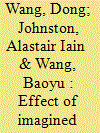

|
|
|
|
|
| Summary/Abstract |
Social identity theory (SIT) suggests that perceived identity difference between groups predicts to intergroup conflict, including interstate conflict. Contact theory suggests that social contact between groups can help reduce intergroup conflict. Contact theory, however, has not traditionally focused on perceived identity difference, and it has not been tested much on real-world interstate conflicts. Employing an experimental design, our study tests for the effects of imagined social contact on Chinese students’ generally malign perceptions of identity difference with Japanese people. We find that imagined contact reduces key perceptions of difference by reducing both perceived Japanese malignity and perceived Chinese benignity. This suggests that social contact helps produce new hybrid in-group. By employing SIT, our findings provide a new microfoundation for contact theory, suggest an important process in the creation of security communities, and provide a proof of concept for public policies aimed at large-scale cultural exchanges.
|
|
|
|
|
|
|
|
|
|
|
|
|
|
|
|
| 4 |
ID:
177010
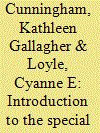

|
|
|
|
|
| Summary/Abstract |
Research on conflict processes has recently highlighted the myriad of tactics rebels use which are not violent in nature (cf. Petrova 2019; Ryckman 2020; Cunningham, Dahl, and Frugé 2017). Concurrently, rebel governance has drawn increasing attention from scholars and peacebuilding practitioners. In-depth historical studies of rebel groups highlight the activities and behaviors that rebels engage in beyond making war—such as providing social services and building local political institutions (Mampilly 2011; Arjona 2016a; Arjona, Kasfir, and Mampilly 2015). Complementing these works, studies have sought to provide cross-national examination of trends in these governance behaviors (Huang 2016; Heger and Jung 2017; Stewart 2018). Despite this work, quantitative and formal research in conflict processes often ignores the insights that the rebel governance literature has generated, frequently focusing exclusively on violent tactics or considering governance issues primarily as part of conflict settlement processes. In this special feature, we work to integrate the study of rebel governance with the conflict processes literature, providing a conceptual link between the two while offering novel contributions to advance our understanding of the dynamic processes of rebel governance.
|
|
|
|
|
|
|
|
|
|
|
|
|
|
|
|
| 5 |
ID:
177015
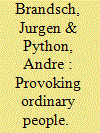

|
|
|
|
|
| Summary/Abstract |
Research on the effects of terrorism mostly focuses on the coercive effects of violence on the macrolevel, while other effects like provocation, particularly on the microlevel, do not receive the same attention. In this article, we seek to address previous omissions. We argue that terrorism can provoke ordinary people into a violent reaction. By reducing perceived security and creating a desire for revenge terrorism may lead civilians to attack uninvolved members of the terrorists’ constituency. Using geo-referenced data on terrorism (Global Terrorism Database) and violent riots (Social Conflict Analysis Database), we assess with a matched wake analysis if the treatment of terrorist violence against civilians causes an increase in violent behavior. The results of our analyses show that terrorism significantly increases violent riots. We thus conclude that terrorism can not only provoke governments but also civilians into an overreaction.
|
|
|
|
|
|
|
|
|
|
|
|
|
|
|
|
| 6 |
ID:
177014


|
|
|
|
|
| Summary/Abstract |
Research on rebel behavior focuses on the violent conduct of these groups. Work on rebel governance, however, has documented the myriad ways in which rebel groups seek to gain legitimacy, project strength, and govern civilian populations beyond direct violence. These efforts stress the importance of governance institutions for securing cooperation and compliance from the civilian population, a central concern for rebel groups. Judicial processes are one avenue through which this cooperation and compliance can be secured. These efforts encompass a range of processes including ad hoc trials, truth commissions and commissions of inquiry, offers of amnesty, and reparations programs. Using new data on the rebel use of judicial processes from 1946 to 2011, I examine the argument that rebel judicial processes can best be understood as a mobilization strategy by the group, offering concessions to a supportive civilian population or coercion when support is weak.
|
|
|
|
|
|
|
|
|
|
|
|
|
|
|
|
| 7 |
ID:
177016


|
|
|
|
|
| Summary/Abstract |
In many countries, police are both guardians of public safety and the primary instruments of state repression. Used to quell dissent, excessive police action can drive further collective action, leading to a repression-dissent nexus. Yet does repression spur dissent for all, or only for those already dissenting? We theorize repression by police causes political backlash, decreasing support for police and increasing political dissent. We argue these effects are conditioned by individuals’ proximity to the repressive act and support for the ruling party. Using a nationally representative survey experiment of 1,920 Ugandans, we find robust evidence for political backlash effects of repression across all demographics, regardless of proximity to the event. By examining the politics of policing, we show excessive police violence triggers political backlash, decreasing general support for the security apparatus and increasing willingness to publicly dissent for some populations.
|
|
|
|
|
|
|
|
|
|
|
|
|
|
|
|
| 8 |
ID:
177011
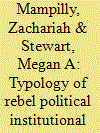

|
|
|
|
|
| Summary/Abstract |
What are the different political institutions rebels create to engage captive civilian populations, and how do they arrive at distinct political arrangements? Rebel-controlled territories host a diversity of political institutions ranging from structures designed to promote democratic decision-making to martial law. Although previous research has focused on rebel social service provision and other aspects of rebel governance, few have investigated variation in the institutional arrangements rebels adopt. In this article, we identify a set of four dimensions along which rebel political institutions vary leading to six ideal–typical forms of political arrangements. We argue that an iterative and dynamic stepwise process, determined by rebel group strategies and local conditions, produces one of these political institutional outcomes. Importantly, the type of rebel political institutions within one location can change throughout the war, and variation sometimes emerges across territories the same rebel group controls. We demonstrate the plausibility of our arguments through a series of illustrative case studies that correspond to the formation processes of our six ideal–typical political arrangements. We conclude with recommendations for future research.
|
|
|
|
|
|
|
|
|
|
|
|
|
|
|
|
| 9 |
ID:
177013
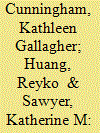

|
|
|
|
|
| Summary/Abstract |
Rebel actors engage in a number of behaviors beyond violent conflict, including social service provision, diplomacy, and establishing local governance. This article centers on an oft-overlooked aspect of rebel behavior and governance: rebel groups conducting popular elections in wartime. We argue that rebel elections are a means through which rebels can strengthen both local and international legitimacy, but that there are risks to employing elections (such as logistical failures or publicized disconnect from civilians). We hypothesize that rebels that are pursuing legitimacy (local and international) in other ways are likely to set up rebel elections and that rebel groups with greater organizational capacity are more likely to introduce elections because they are well placed to manage the risks elections entail. Using a global data set of rebel use of elections where local civilians vote to elect rebel representatives at various levels of organizational hierarchy, we find empirical support for these propositions.
|
|
|
|
|
|
|
|
|
|
|
|
|
|
|
|
|
|
|
|
|